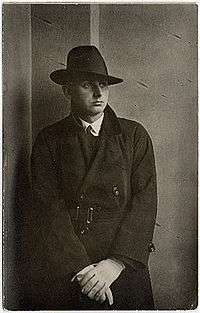Anšlavs Eglītis
| Anšlavs Eglītis | |
|---|---|
 | |
| Born |
14 October 1906 Rīga, Russian empire (now Latvia) |
| Died |
4 March 1993 Los Angeles, California, U.S. |
| Occupation | writer, novelist, journalist |
| Nationality | Latvian |
| Spouse | Veronika Janelsiņa |
Anšlavs Eglītis (October 14, 1906 – March 4, 1993) was a Latvian writer, journalist and painter who became a war refugee in 1944. He had prolific career as a novelist, and his later work often examined aspects of exile life.[1]
Biography
Anšlavs Eglītis was born in Riga, Latvia, the first of two children born to his parents. His father was a latvian writer Viktors Eglītis who was one of the most notable representative of Decadence in latvian literature. During First World War family lived in Russia, but returned to Latvia in 1918. For a short time they settled in Alūksne. Since 1919 family lived in Riga and Anšlavs started his studies in Riga City gymnasium No. 2. Also he studied painting in the studio of a latvian painter Voldemārs Tone. The family spent all their summer holidays in Inciems cottage, he later described in his novel Pansija pilī (1962). He caught tubercolosis in 1925. His mother, who also suffered pulmonary disease died during his stay in Leysin sanatorium.
He continued his studies in the Art Academy of Latvia and graduated in 1935. After graduation he worked as a teacher of drawing. In 1936 his first collection of novels Maestro was published. In 1938 Eglītis started to work as a journalist in the biggest Latvian newspaper Jaunākās ziņas. In 1940, he also collaborated to magazine Atpūta.
He left Riga for Courland in October 1944 and later moved to Germany where he settled in Berlin. During Battle of Berlin his flat was destroyed in air raid and Eglītis moved to Switzerland. In 1950, he moved to California, USA. His father, writer Viktors Eglītis was arrested, tortured and killed in the Cheka building in Riga in 1945. His grave is unknown.
In his American exile, Eglītis wrote more than 50 novels and short stories. Parallel to his literature career he became a theatre and film critic for the latvian newspaper Laiks, which also serialized a number of his novels.[2]
He died from cancer in Los Angeles in 1993. In 2006, Latvia Post issued a commemorative stamp in honor of Eglītis. The monument to a writer was installed in 2008 in Inciems.[3]
Sources
- Barkan, Elliott Robert (2013). Immigrants in American History: Arrival, Adaptation, and Integration. Greenwood: ABC-CLIO. p. 1931. ISBN 1-299-10408-8. OCLC 828140721.
References
- ↑ "Immigrants in American History: Arrival, Adaptation, and Integration: "Exiles", Not "Immigrants"". ABC-CLIO. 2013. Retrieved February 1, 2015.
- ↑ "Maestro Anšlavs Eglītis un viņa romāni.". Jaunā Gaita nr. 136. 1981. Retrieved February 1, 2015.
- ↑ "Pansija pilī ziemā" (PDF). Dienvidkalifornijas latviešu informācijas biļetens. 2008. Retrieved February 1, 2015.
| Wikimedia Commons has media related to Anšlavs Eglītis. |